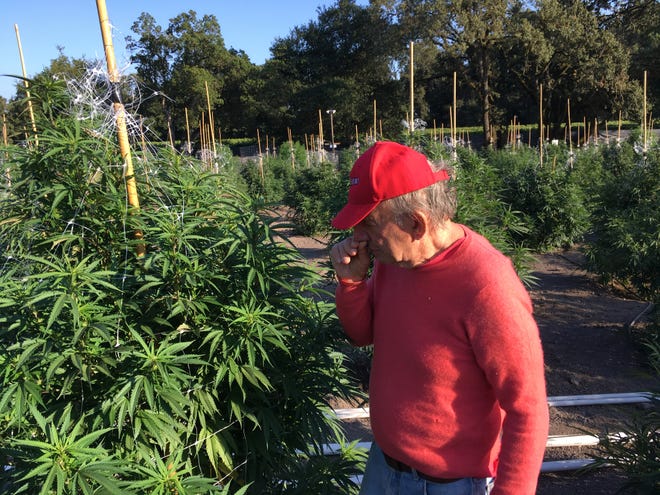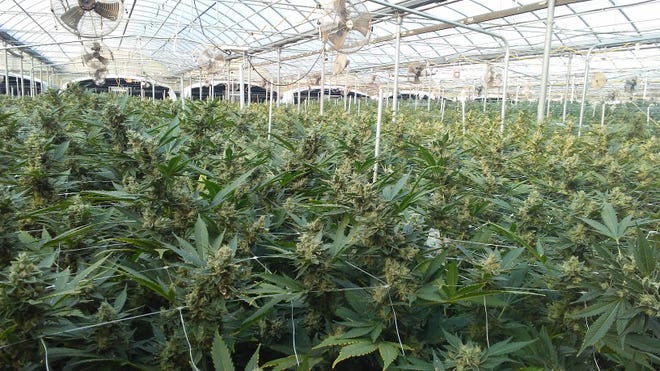2017 will go down as the ‘Fire Harvest’

BY JONAH RASKIN
During the week of October 8, I spent five days, Monday through Friday, on a medical cannabis farm in Sonoma County. I did not expect that fires would rage all around the farm, nor did I think that I would look up at the hills above the valley and see flames licking at the trees and the grasses. But there they were and there we were not a quarter of a mile away.
Every cannabis harvest that I have witnessed over the past 37 years has been different, but this year’s harvest has been far different than any other. Every year there has always been the risk of a police raid, a robbery and bad weather. This year’s fire added more of a sense of emergency than ever before. The manager, the foreman and the whole crew knew that they might lose much, if not all, of the crop, and that they might be forced to flee from the fire at a moment’s notice to save themselves.
This year’s cannabis harvest will be known as the fire harvest.
Fortunately, the harvest that I witnessed started on September 20, two days after thieves broke through the fence that surrounds the property and stole a dozen or so plants. From September 20 until October 8, a span of 18 days, I documented hundreds of mature plants getting harvested every day from dawn to dusk. I started out writing about marijuana for the Chronicle & Examiner in 1980, and then for more than two decades for High Times — so I am known and am trusted by many growers, and I am welcomed.
Part of the reason the farm was harvesting early was an $88,000 tax bill that had come due. Ninety percent of the crop had been harvested by the time the fires broke out — so it did not sustain substantial smoke damage. This was a common story in the county and around California.
Once plants were cut down with loppers, they were brought into a shed that’s open on two sides. There the plants were broken down, the branches removed from the trunks and the stems removed from the branches. Then the stems were packed in large plastic containers and transported by truck to a warehouse where the buds were trimmed by a workforce made up of people from close to home and around the world.
The farm was fortunate, indeed. Other growers in Sonoma lost their crops and their barns, though it’s still too early to know for certain how much marijuana has been lost due to the fire, just as it’s still too early to know for sure how many grapes have been lost.
The harvest that I witnessed ended on Friday, October 13, and, while fires were still burning from one end of Sonoma to another, every crewmember considered himself and herself fortunate, indeed. Friday was payday. The foreman handed out a dozen or so checks.
“Don’t wait too long before cashing them,” he said.
Work on the farm will continue in the days and weeks ahead. There’s a strong sense that the product has to reach market right now. After all, the crew has been in the field every day for five months. The farm owner and the foreman want to collect on their investment and their labor, though it’s not yet clear how much money they will get for a pound. That depends on supply and demand and on market fluctuations which will be affected by the fire. Growers hope for $1,000 a pound wholesale.
None of the growers I know who have lost their crops are crying or asking for sympathy. They’ve all said that they’re already in “rebuild mode.” Nor have any of them asked for tax relief or any other kind of relief from the county.
Still, it seems that Sonoma county officials as well as officials in other North Coast counties ought to extend deadlines for growers who aim to come up from underground and join the legitimate market. If deadlines aren’t extended there might not be much of a legitimate cannabis market at all next year in those regions.
No doubt some opponents of legalization and regulation would like that. But those who use cannabis medicinally and recreationally would be sorely disappointed. If counties help citizens in distress, they might also help cannabis farmers who are teetering on the edge of survival.
Jonah Raskin is the author of Marijuanaland: Dispatches from an American War

